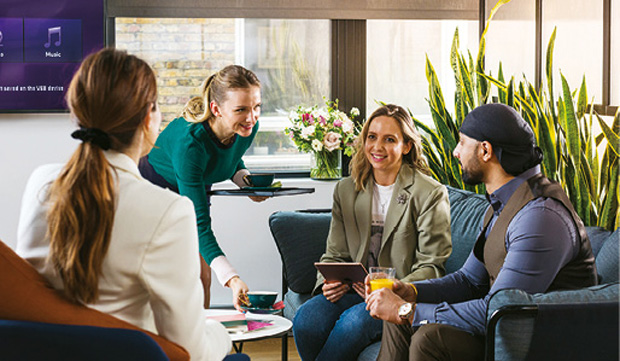Front of House providers explain to FMJ how reception and guest services have evolved to support fluctuating occupancy levels while helping to create a sense of community in the workplace
According to research by Moneypenny, 82 per cent of FMs surveyed still have a receptionist at their office, and 82 per cent believe they will still have one in five years’ time. But the survey also confirms that the role of the receptionist has expanded, with over 31 per cent carrying out broader concierge or Front of House (FOH) duties.
“The responsibilities of those working in guest services have become vastly more varied, particularly with the advent of hybrid-working,” says Jose Saez, Operations Manager at Portico. “Our guest services team has evolved to be more agile, with its remit expanding to incorporate supportive functions. Working alongside the facilities team, these responsibilities could include acting as location first aiders, being the main point of contact for all floors, or carrying out induction training for new starters. In some locations, our guest services teams are also responsible for running cycle parks and looking after meeting spaces.”
Flexibility is the key to navigating fluctuating occupancy levels says Zoë Watts, MD of Bennett Hay. With three-day regimes that see Tuesday, Wednesday, and Thursday as the days with the biggest footfall, clients often use the peak time in the office to get their workers together for events or business briefings.
She explains: “We’ve been involved in pop ups and talks, which inevitably need to be organised, so our front of house teams have to become involved in a far wider scope than the norms of reception services and the post room.”
Changed working patterns mean FOH providers are rescheduling their own teams. For On Verve, staff, known as DayMakers, Monday to Thursday are longer workdays and Fridays are shorter. Explains Bianca Angelico, On Verve Director and Chief DayMaker: “We have made adaptations to our outputs on Fridays, prioritising tasks such as auditing and weekly checks instead of attempting them on busier days. We have modified our operations and schedules accordingly, and this approach has proven to be highly effective.”
Brigita Perry, Workplace Engagement Manager at Anabas FOH says service provisions also need to evolve if they are to effectively support employees working in the office and those working from home. This means being more hands-on, helping employees to plan meetings and events, both physical and virtual, and booking required facilities on their behalf.
She explains: “At Anabas, we’ve created specialist roles for our clients to facilitate this. In my role as Workplace Engagement Manager, for example, I’m responsible for creating a workplace community which positively impacts culture. We regularly run events and workshops to enrich personal and professional development. We also host retail and food pop-ups to aid socialisation. We listen to what employees want and need and respond to this.”
VISITOR EXPERIENCE
Forty-five per cent of respondents to the Moneypenny survey said that welcoming guests was the top responsibility of FOH staff. Anabas’ Perry says for visitors and guests that grace a workplace on a sporadic, infrequent basis, a personal level of detail isn’t always possible, but guest services personnel should always seek to find out from the host who the guest is, the nature of their visit, and greet them by their name.
For Angelico of On Verve: “Everything has changed in the corporate space since COVID-19, from dress code to the extent of formalities. Therefore, it is essential to adjust our services accordingly. Our relationship with clients is built on a true partnership, where personalisation is key.”
According to Watts, at Bennett Hay, greater corporate responsibility towards DEI means they’ve invested in the development of their people so that they can offer an inclusive welcome to guests and employees.
“Our procedures and practices are emerging and are deliberately flexible to ensure we address our clients’ changing workforces. We’re training our teams so we can increase awareness and understanding of different cultures, backgrounds, and most specifically perspectives.
“As a reflection of our client’s brand and as we often set the initial impression it’s critical that we get it right from the outset. There’s a marked move away from subservience to a culture of putting people at ease and putting a smile on their face, whatever their status is.”
Discreet but effective security is a crucial part of the visitor remit as Seetan Varsani, Divisional Director, London, Corps Security points out – while differing approaches maybe taken depending on the site, the principle remains to give visitors a positive host and guest experience.
“All our colleagues undergo training to build a broad and up-to-date awareness for FOH security measures and procedures. By using specialist VR training modules, our colleagues, both existing and new, are inducted and kept up-to-date with ongoing and regular update courses that reflect real-life scenarios in an immersive setting – while not interrupting operations at the client site.”





